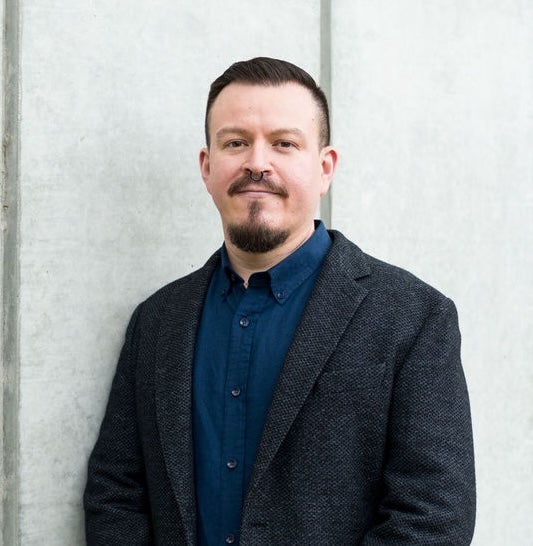
September 26, 2025
Podcast: Eating Disorders: A Contemporary Introduction with Tom Wooldridge
Psychology experts explore psychoanalytic insights into eating disorders in this 50-minute podcast with GGU’s Dr. Tom Wooldridge.
October 15, 2025 | 12:00pm PT
Join us for a 30-minute virtual info session to explore Golden Gate University’s MA in Counseling Psychology and Industrial-Organizational Psychology programs.
The program director will share insights and answer your questions about admissions, tuition, and deadlines. Don’t miss this chance to discover how GGU can support your path to becoming a licensed therapist.
Register today and take the next step in your counseling career.

Program
Counseling Psychology, MA
Format
Online, Hybrid
Total Units
60
Requirements
No GMAT or GRE Required
Spring ’26 Final Application Deadline
January 3
Use the following links to access: the Psychology Handbook, the Counseling Psychology Informed Consent Form, and the Counseling Psychology Disclosure & Attestation Form.
Golden Gate University’s Master of Arts in Counseling Psychology program offers a holistic approach to mental health education that prepares students for real-world practice. Our program is uniquely positioned through its strategic partnership with the Psychotherapy Action Network, aligning our curriculum with cutting-edge advocacy for mental health policy that recognizes the complexity of individuals beyond their symptoms. This partnership, combined with our intensive traineeship program requiring 300 face-to-face clinical hours, provides students with a rare blend of theoretical knowledge and practical experience.
Additionally, our program offers unparalleled flexibility and support for students pursuing licensure in California or other states, with personalized guidance from dedicated faculty and staff. The combination of a license-eligible curriculum, holistic philosophy, intensive practical experience, and individualized support makes GGU’s program a distinctive choice for aspiring psychotherapists seeking a comprehensive and adaptable counseling psychology education.
Our cutting-edge curriculum ensures students are well-prepared for the evolving landscape of mental health care, with a unique blend of academic rigor and practical preparation. The program stands out for its personalized support, from comprehensive traineeship assistance, and its holistic approach to psychotherapy that emphasizes individual complexity beyond symptoms and diagnoses. With options like the Undergraduate Psychology Pathway Program and a flexible personal psychotherapy requirement, GGU offers a balanced, accelerated path to becoming a skilled, licensed therapist. At GGU, students invest in a program that not only provides comprehensive academic knowledge but also emphasizes practical skills and personal growth, preparing them to make meaningful contributions to the field of counseling psychology.
In this virtual info session, we explored Golden Gate University’s Master’s programs in Counseling Psychology and Industrial-Organizational Psychology.
A message from Tom Wooldridge, Department Chair and Associate Professor of Golden Gate University’s Master’s in Counseling Psychology program. Learn what makes this program the perfect choice for anyone interested in building their career in the world of psychology.
Online or Hybrid Courses
60 Credits
No GRE/GMAT Required
Top Ranked Master’s Program
Attend Full-Time or Part-Time
Graduate in as Few as 2.5 Years
Choosing to pursue a Master’s in Counseling Psychology at GGU was among the best choices I have ever made in my life. The curriculum laid the educational and theoretical foundation for my practice today, and the faculty fostered an environment where I was not simply learning theory, I was learning how to practice my therapy. The clinical experience and expertise of the GGU faculty offered students the space to creatively explore the various aspects of psychology without judgment, and the opportunity for students to ask questions about the current field. Without GGU, I would not have the clinical and educational background to work at my dream job, battle systemic inequities in our communities, and pursue my doctorate.
Graduates of the Master of Arts in Counseling Psychology will possess the skills and knowledge to:
Earning your Master’s in Counseling Psychology can help you qualify for new roles, pursue counseling certifications and licensure, and give you a path to earning your doctorate if you’re interested in continuing your education. Counselors are currently in high demand in a variety of industries, with the Bureau of Labor Statistics estimating that there will be about 281,600 job openings each year, on average, through 2032.
Graduates of GGU’s MA in Counseling Psychology program have pursued diverse careers in mental health and related fields. Many have become Licensed Marriage and Family Therapists (LMFTs), working in private practice, community clinics, and healthcare settings. Others have taken roles as Mental Health Specialists, Clinical Therapists, and Substance Abuse Therapists in hospitals, rehabilitation centers, and mental health facilities. Some alumni work in educational settings as School Psychologists or Counselors.
The program has also produced graduates who work as Research Coordinators in universities, Clinical Supervisors in mental health agencies, and Professors in higher education institutions. Many of our alumni have gone on to open their own private practices or work in community mental health centers, focusing on individual, couple, and family therapy. Some have specialized in areas such as EMDR therapy, trauma-informed care, or working with specific populations like children or the LGBTQ+ community.

Golden Gate University graduates in the field of psychology earn 61% more than the national median for the field.
Source: WSCUC Key Indicators Dashboard (KID) — Summer 2025 Dataset. Earnings data is provided only for students who received federal financial aid and were working at the time of data collection (5 years after graduation).
Our curriculum meets the educational requirements for MFT licensure and LPCC licensure in California. The curriculum also meets the educational requirements for MFT and/or LPCC licensure in some other states. View psychology licensure details here.
If you intend to pursue licensure outside the state of California or are completing the program, including the traineeship, outside the state of California, speak with a faculty member in the Department of Psychology to discuss the licensure requirements in your state of interest prior to beginning the program.
While this program is available fully online, please note that the Practicum course near the end of the degree program is conducted in a synchronous format via Zoom, requiring real-time participation. This allows for enhanced interaction and collaboration with instructors and peers.
Students entering the counseling profession benefit professionally, personally and academically from personal psychotherapy. During the program, students must complete 50 hours of psychotherapy with a licensed clinician or therapist under supervision by a licensed clinician (Psychiatrist, Psychologist, MFT, LPCC, or LCSW). Students may select individual, couple, family or group psychotherapy or some combination of these. If the psychotherapy requirement presents an unmanageable emotional and/or financial burden, it may be deferred to post-graduation or waived entirely with the permission of the Program Director.
As a pathway to the graduate-level counseling programs, students who complete certain undergraduate-level courses with grades of “B” or better at Golden Gate University as a part of completing the Bachelor of Arts in Psychology or a Psychology minor with another Bachelor’s degree may receive internal transfer credit for the corresponding graduate-level courses for the Master of Arts in Counseling Psychology or the Graduate Certificate in Counseling Skills programs. Internal transfer credit will be recorded after students’ Bachelor’s degrees have been conferred. Note: Students who complete the courses below but who do not earn Bachelor’s degrees at GGU with Psychology majors or minors (formerly concentrations) are not eligible for this incentive.
Students who complete the following undergraduate courses may receive internal transfer credit as shown below:
Students must complete a total of 9 units of PSYCH 394 – Practicum: Counseling Psychology.
Traineeship placement is a foundational aspect of your education here at Golden Gate University. In traineeship, you begin to apply the didactic knowledge you have gained in your courses to the broad range of tasks that confront professional psychotherapists, under the guidance of a licensed supervisor and with the support of an on-campus clinical case conference led by one of our professors. If you intend to pursue licensure outside the state of California or to complete your traineeship in another state, please speak with a faculty member in the Department of Psychology prior to beginning the program.
Although faculty and staff are available to assist, students who intend to pursue licensure outside the state of California are responsible for determining the traineeship requirements for the relevant states, such as additional face-to-face hours or particular supervisor qualifications, and for working with faculty and staff to make sure that any additional requirements are met.
Before applying for a traineeship, a student must advance to Traineeship Candidate status. A student must apply for Candidacy before the end of their second trimester of enrollment. To apply for Candidacy, a student must complete the Traineeship Candidacy form, which must be submitted to the Department Chair. This form, in addition to feedback from faculty and any atypical reports that have been submitted by professors due to academic or behavioral issues in the classroom, will be reviewed by the Program Director to assess the student’s academic and emotional preparedness to begin traineeship and continue on the path to pursue licensure as a psychotherapist. In addition, the student must have completed or plan to have completed by the time their traineeship will begin at least PSYCH 320, PSYCH 321, and PSYCH 326 and have made substantial progress toward completing their courses on psychotherapy theory (PSYCH 323, PSYCH 324, PSYCH 325, and PSYCH 339). Candidacy also requires that students verify that they have started the process of accruing personal psychotherapy hours or have applied for a waiver or modification of the personal psychotherapy requirement, as required by the program, and have confirmed a path to completion of their remaining courses through meeting with their academic advisor. Upon receiving Traineeship Candidate status, the student may begin working with the Department’s faculty and staff to apply for traineeships. International students in F-1 or J-1 visa status must also have their employment authorization eligibility confirmed by their academic advisor/DSO. In the event that a student is not advanced to Candidacy status, the student will be notified in writing.
If there are concerns about a student’s academic or emotional readiness for traineeship or psychotherapeutic practice, a Traineeship Candidacy Committee of at least two faculty members will be convened and, whenever possible, a plan will be developed with the student to address gaps in academic performance or emotional readiness. Similarly, if a student’s traineeship placement is terminated for any reason, their readiness to participate in another traineeship will be evaluated by the Candidacy Committee according to Candidacy guidelines. If reports are submitted regarding academic or behavioral issues in the classroom after Candidacy has been approved, the Committee may reconvene to review those reports and require an in-person meeting with the student. In rare cases, the Committee may decide that the student has failed to demonstrate professional and personal responsibility (as evidenced by violations of professional conduct, interpersonal trust, or ethical practice) and require students to leave the program.
Golden Gate University has an outstanding reputation with a wide range of traineeship placements in San Francisco, in the wider Bay Area, and in many other states. Our Traineeship Coordinator and Career Services Staff work with students to develop a compelling traineeship application, including a professional curriculum vitae, and also provide guidance with professional interviewing. We maintain relationships with traineeship placements and their directors throughout the Bay Area and beyond and consistently places students at top traineeship sites.
Traineeship sites vary depending on the population that they serve and by the treatment modalities and clinical specialties implemented at their site. These sites include state, county, and community mental health facilities as well as outpatient clinics, psychiatric hospitals, schools, residential treatment programs, chemical dependency treatment programs, and other settings.
We help students to select traineeship sites that are consistent with philosophy of our training program. We believe that psychotherapy must acknowledge the complexity of the individual and the uniqueness of individual suffering, rather than the identification and resolution of discrete symptoms. Psychotherapy is envisioned as a complex process of individual growth and change, and the psychotherapeutic relationship is seen as a key element in successful treatment. The student’s relationship with his or her clinical supervisor, similarly, is seen as an integral aspect of professional development. Based on these criteria, we approve each site and have a written agreement with each site that details each party’s responsibilities. The agreement provides for regular progress reports and evaluations of the student’s performance.

Director of Clinical Training
Distinguished Adjunct Professor
Licensed Marriage & Family Therapist in Private Practice
Chad Tynan studied psychology at UCLA and earned an MA in Psychology from Golden Gate University. Chad is a licensed marriage and family therapist based in San Francisco, California. His specialty training includes Gottman method, emotionally focused couple’s therapy, and discernment counseling.

Distinguished Adjunct Professor
Joe Zarate-Sanderlin has MA in Counseling Psychology from Pacifica Graduate Institute. They have a private practice in San Francisco where they work with relationships, sexuality, and gender. They teach PSYCH 304, 320, 325, 331, 394.
The tuition for most graduate degree programs at Golden Gate University is $1,090 per unit, covering the cost of high-quality, career-focused education led by experienced faculty. This investment supports essential resources, including personalized academic advising, state-of-the-art technology, and student services designed to help adult learners succeed.
Our program stands out for its intensive traineeship requirement, flexible learning formats (including web conference, asynchronous, and hybrid options), and our strategic partnership with the Psychotherapy Action Network. We also offer a holistic approach to psychotherapy education and comprehensive support for students pursuing out-of-state licensure.
The MA Counseling Psychology is offered in three different modes: web conference (fully online, synchronous course meetings), asynchronous (fully online, but without live course meetings), and hybrid. The web conference and asynchronous modes do not require residency. The hybrid mode requires that students attend classes during two designated campus weeks each term. Students may take courses in multiple formats each term, if desired.
Students can begin the program in the Fall, Spring, or Summer trimester, allowing for multiple entry points throughout the year.
The Master of Arts in Counseling Psychology program at Golden Gate University offers flexible completion times to accommodate various student needs. Full-time students typically complete the program in 2.5 years. Part-time study is considered any duration beyond 2.5 years, with completion time varying based on individual course load and pace.
Please note that the program includes an intensive traineeship requirement, which involves at least three trimesters of practical experience, including 300 face-to-face clinical hours. This hands-on component is integral to the program and contributes to the overall duration of study
The program requires a bachelor’s degree from an accredited institution. While a background in psychology is beneficial, it’s not mandatory. We welcome applicants from diverse academic and professional backgrounds.
Yes, our program is designed to accommodate working professionals. We offer flexible learning formats and part-time study options. However, students should be prepared for the time commitment required for coursework, traineeship, and personal psychotherapy components.
WThe traineeship is an integral part of our program. Students are required to complete at least 300 face-to-face clinical hours under supervision over the course of at least three trimesters. Our program often allows students to accumulate more than the required hours for MFT licensure in California and many other states.
Yes, our program is designed to meet the educational requirements for MFT licensure in California. We also provide support and guidance for students pursuing licensure in other states.
atWhile we don’t guarantee job placement, our Career Services department and faculty provide comprehensive support, including assistance with traineeship applications, CV development, and interview preparation. Our intensive traineeship often gives MA in Counseling Psychology graduates a head start in their careers.
Hybrid students attend most classes via Zoom but are required to participate in two on-campus sessions at our downtown San Francisco location during designated campus weeks.

Admissions
Find out more about admission requirements for your program, tuition and financial aid options, scholarships, and how to start your application.

Student Experience
Explore all of the resources available to our GGU community, including career services, advising, tutoring, and support for military students and international students.

About the Ageno School of Business
Learn more about GGU’s Ageno School of Business, including our 100+ year history, renowned faculty, and innovative programs.
